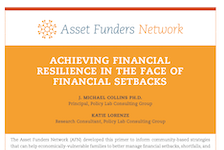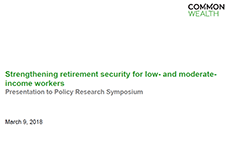Discover financial empowerment resources
Discover financial empowerment resources
Over the last two years, digital payment solutions, including peer-to-peer apps, digital wallets, and contactless payment solutions, have grown in popularity and adoption. With 125 million American mobile payment users predicted by 2025 Commonwealth sought to understand the potential for these...

Financial empowerment (FE) is an approach to poverty reduction that focuses on improving the financial security of people living on low income. Evidence shows that embedding FE interventions into municipal welfare, employment, housing, shelter and health services can significantly boost service...

This infographic is a preview of Commonwealth's research survey of 1290 lower-and moderate-income people to understand their perceptions, needs, and uses of conversational...
In this webinar, Commonwealth in partnership with DCIIA Retirement Research Center (RRC) and SPARK Institute present findings from our new research about drivers and considerations of recordkeeper-provided emergency savings and host a discussion with industry...
The Asset Funders Network (AFN) developed this primer to inform community-based strategies that can help economically-vulnerable families to better manage financial setbacks, shortfalls, and shocks. The goal of this brief is to provide a common understanding and language for funders and financial...

This brief emerged from a conversation, held in late March 2020, among a number of individuals and organizations who work on issues of household financial security. Employers with financial resources and governments have an opportunity to use the workplace as a significant channel to deliver...

In this video presentation Johnathan Weisstub from Common Wealth discusses recent improvements in senior Canadians' poverty levels due to benefits such as OAS and GIS, and the challenges that still remain in ensuring retirement security for modest-earning and low-income Canadians. This...

The research and policy symposium on income volatility was held on March 9, 2018, in Toronto, Ontario. Speakers from Canada and the United States present on key research findings on the nature of income and expense volatility in the early 21st Century. Speakers also suggest policy solutions to...

The 2013 Survey of Consumer Payment Choice (SCPC) is the sixth in a series of annual studies conducted by the Federal Reserve Bank of Boston to gain a comprehensive understanding of the cash and noncash payment behaviour of U.S. consumers. This report summarizes data collected in the 2013 SCPC and...
Family income volatility has increased over the past three decades, though the trend for individual earnings volatility is less clear. Low-income households have more volatile incomes than do higher income households and this gap has grown over time. Job losses, reductions in employment hours, and...
Approaching anti-poverty work from this view point asks that we re-think the social compact between government and its constituents. It demands that we think beyond reactive policies focused narrowly on crisis intervention and preservation of the safety net, to policies that aim to proactively help...
